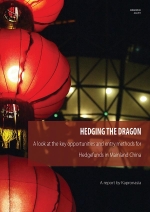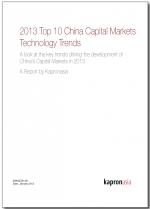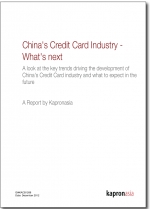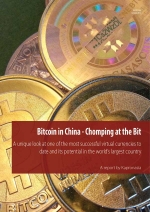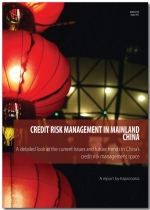Financial Industry Research Reports
Hedging the Dragon: The Opportunity for Hedge Funds in China
Published: Jun 2013Hedging the Dragon offers one of the most comprehensive looks into the Chinese Hedge Fund industry and details the potential opportunity for foreign hedge funds to enter the market providing insight on the market opportunity itself as well as some of the market entry options and key considerations for foreign funds as they consider the market.
Top 10 China Banking Technology Trends 2013
Published: Jan 20132001-2010 could be considered the 'banking reform' years. During that decade, we saw an incredible opening up in the market with opportunities for both domestic and foreign banks expanding greatly. Although reform has slowed slightly, the industry is still in a period of change and 2013 will be no exception.
Top 10 China Capital Markets Technology Trends 2013
Published: Jan 2013Margin trading, financial futures and cross-border investing are just a few of the areas that have seen tremendous changes in the past five years and will see much more as the market continues to develop and we see new products and opportunities emerge.
China's 3rd Party Online Payment Industry - What's Next
Published: Aug 2012With online commerce booming in China, consumers are able to order just about anything online and have it delivered cheaply and efficiently. Traditionally these transactions were conducted as 'cash on delivery', but this is rapidly changing as online payment providers start to fill the gap.
Banking On China - A Look at the Challenges and Opportunities for Foreign Banks in China
Published: Jul 2012With the Chinese economy continuing to grow rapidly, the financial sector in China is one of the few globally that offers a unique opportunity for international banks, but also has challenges.
China's Prepaid Card Market
Published: Jul 2012Prepaid / stored value cards are an important part of the payments market in China and are used to pay for almost everything such as from daily public transit to grocery supermarket and from movie tickets to clothes in shopping centers.
China Markets 2012: A Look at the Key Trends and Issues in Mainland Markets and Their Effect on Hong Kong
Published: Jul 2012Kapronasia was in Hong Kong for Sungard's Financial Industry Day in July 2012 and Zennon Kapron presented the attached slides in two sessions on the latest trends and issues in China's economy and financial markets.
Swift and China's Banks
Published: Jun 2012随着中国金融业走向世界,SWIFT组织在金融全球化进程中扮演了越来越重要的角色,中国的银行也更加重视与SWIFT的合作。Kapronaisa咨询最新的研究报告—《SWIFT与中国银行业》详细介绍了SWIFT组织的由来和发展,深度分析了SWIFT与中国银行业的关系以及对中国金融业所产生的影响,同时对未来SWIFT在中国的发展也提出了展望。
A Look at the Challenges for Shanghai to Become an International Financial Center by 2020
Published: Jun 2012Much has been written since March 25, 2009, when China’s State Council declared that by 2020, Shanghai would establish itself as one of the world’s preeminent international financial centers. Many of the subsequent documents, studies, opinion pieces and press releases about the State Council’s decision center on several key issues many feel the authorities in China need to address to ensure their vision of Shanghai comes to pass.
Trends Shaping China Capital Markets Technology in 2012
Published: Apr 2012This set of slides entitled "A look at the trends shaping China Capital Markets Technology in 2012" was presented by Zennon Kapron at TradeTech China in April 2012. The slides look at some of the key drivers and statistics that define China's capital markets today.
Social Media and Banking in China
Published: Mar 2012Understanding attitudes and perceptions towards social media and banking are a key prerequisite for organizations to better tailor their services and offerings to customers. While there have been studies looking at this in the US, few studies have looked at the attitudes in China, which is the focus of this report.
China's Mobile Payments Industry - What's Next
Published: Mar 2012Offering a relatively cheap and certainly more convenient method of making payments than traditional cash or card methods, payments made through the mobile phone promise to change the way we pay for goods and services and are a rapidly growing area of the global financial industry. We saw a number of advancements in 2011 and expect this to continue at an even faster pace in 2012. The mobile payment industry in China is growing rapidly as well.
China's Credit Card Industry - What's Next
Published: Dec 2011Cultural, geographical and political challenges have for many years kept China a very cash-based society. When credit cards first started to appear on the market, uptake was slow and banks struggled to find a business model that worked. Several years later, the market has changed dramatically. Now as an increasingly popular payment tool, the credit card has played a pivotal role in the stimulation of domestic consumption, with card circulation exceeding 280 million and total transaction value accounting for 42% of China’s total retail spending value.
Bitcoin in China - Chomping at the Bit
Published: Oct 2011What happens when you combine one of the most promising virtual currencies in the world with the largest country in the world? Even with the huge market potential though, will Bitcoin really take off in China? Can the Chinese consumer shift the value of the virtual currency as they did with gold in early 2013? What will the government eventually and inevitably do to control the currency? The Bitcoin in China: Chomping at the Bit report is one of the only reports available today that takes a comprehensive look at the current and potential market for Bitcoin in China.
Credit Risk Management in China's Banking Industry
Published: Aug 2011Although Chinese banks have in the past not focused tremendously on risk management, recent events and comments from regulators indicate that risk management will be more of a focus for banks. In the second in our series of reports on risk management in China, we look at credit operational risk management in Chinese banks to understand more about what it is, how things are different in China and what will happen in the near future.

